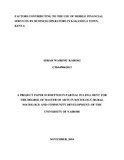| dc.description.abstract | Financial services in the past have been difficult to access and were usually customer friendly to
the wealthy in society. Accessibility to the services by the poor in the society was expensive
since most of them were located in big towns. In the last few years however, technology
revolutionized the manner of how people are handling financial matters. The convergence of
telecommunication and banking services has created opportunities for the emergence of mobile
financial services, in particular mobile banking. This has made banking reach rural areas to the
poor in the society who can improve their social life through the operation of MFS businesses in
their locations. Although the use of mobile financial services on society is vast and can be
examined through a variety of disciplines, study on the factors contributing to mobile financial
services use amongst business operators is important.
The general objective of the study was to find out the factors contributing to mobile financial
services use by business operators in Kakamega town. Specific objectives were to: analyze how
characteristics of users contribute to the use of mobile financial services by business operators in
Kakamega town; find out how the level of awareness contributes to the use of mobile financial
services by business operators in Kakamega town; analyze how level of use contribute to the
performance of mobile financial services by business operators in Kakamega town; and find out
how user perceptions contribute to the use of mobile financial services by business operators in
Kakamega town.
This study was conducted through cross sectional research design. The study sampled 5 blocks in
Kakamega town namely Mega Mall Street, Ambwere Street, Ankoi Street, Canon Road and
Khasakhala Road. Systematic sampling technique was used to sample MFS operators from each
block. The study also sampled 8 key informants from the MFS providers. Both quantitative and
qualitative data were collected in this study. Quantitative data were collected from the
questionnaires while qualitative data were collected from Semi structured interview guide. | en_US |

